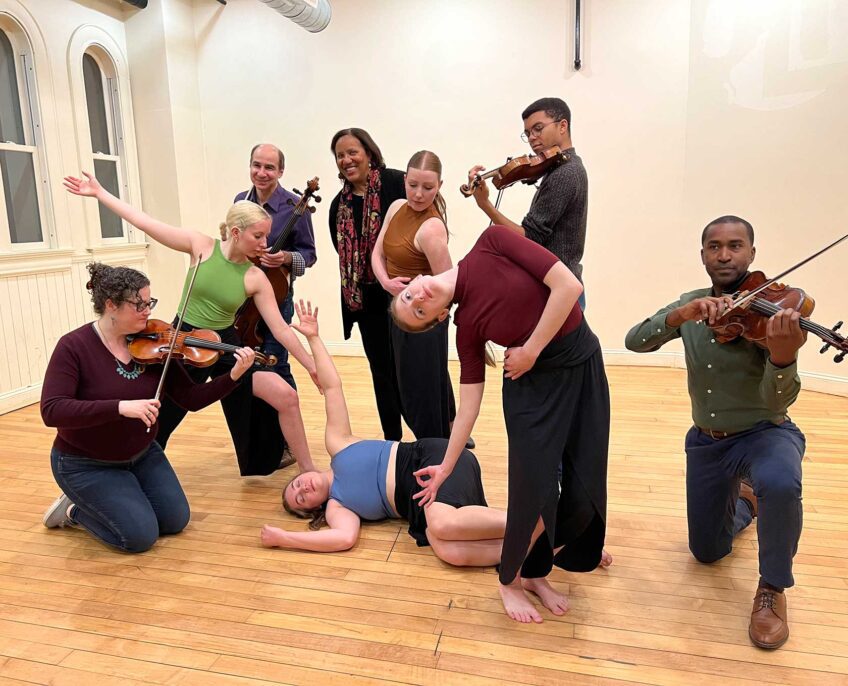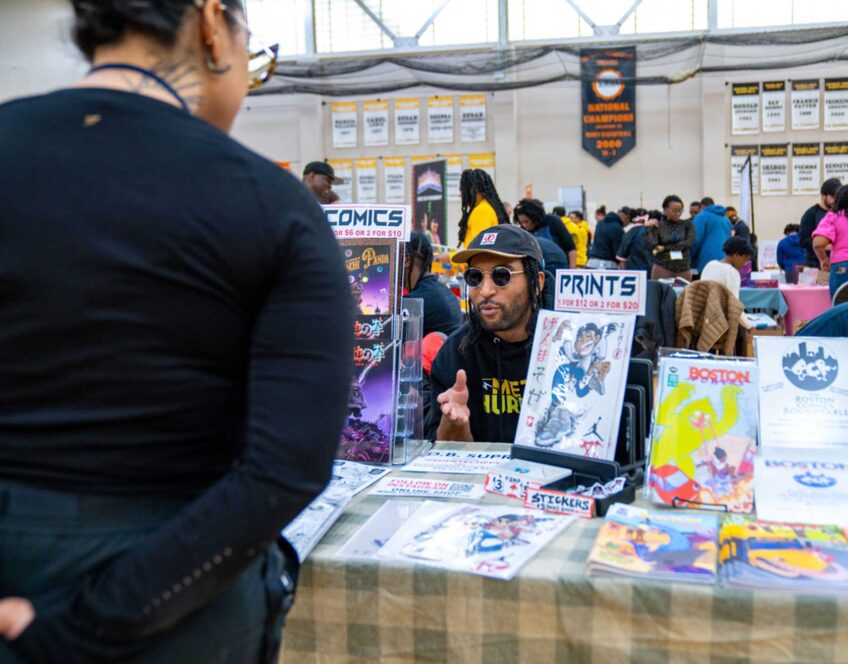“The Bluest Eye,” Toni Morrison’s landmark 1970 novel, is a hard story. Its sharp emotional resonance makes it difficult to read, difficult to feel, difficult to let inside your head and your heart. But playwright Lydia Diamond’s theatrical adaptation of the book, and local theater group Company One’s fantastic production of it, not only do the legendary author’s work justice — they give it new life.
Set amid racial turmoil in Morrison’s hometown of Lorain, Ohio, in 1941, it is the story of Pecola (Adobuere J. Ebiama), an ugly young black girl born to ugly black parents Cholly and Pauline Breedlove (Christopher Long and Talaya Freeman) in an ugly, fractured black marriage marred by drunkenness, violence and the hateful perversion of what once was love.
Unpopular and unloved, Pecola prays for the kind of pure, deep blue eyes owned by Shirley Temple, white baby dolls and the cartoon girl on the package of Mary Jane candies, believing that having such pretty eyes will make everyone — her parents, her teachers, kids at school like light-skinned, upper-crust ideal Maureen Peal (Rachael Hunt), the mean old man at the grocery store — treat her better, if not love her.
After Cholly sets fire to the Breedloves’ home, Pecola goes to stay with Claudia and Frieda MacTeer (Tasia A. Jones and Marvelyn McFarlane) and their family while her parents’ situation gets sorted out. The two sisters guide the audience through Pecola’s story, sharing most of the narration duties and, through their home life, providing a measuring stick against which to assess Pecola’s. Though Claudia and Frieda don’t have much, they have reliable, caring parents (Christina Bynoe and Aaron Andrade, who pulls double-duty as “dream interpreter” Soaphead Church), a stable home filled with love, and one another.
As the story unfolds, flashbacks tell how racism and hate chipped Cholly and Pauline into such jagged people and show the sins of their disfigured pasts shaping Pecola’s life. It all culminates with Cholly’s rape and impregnation of his daughter, a sickening event made all the more disturbing by the painful juxtaposition of the Breedloves’ harsh reality with the white, happy, fictional family from the “Dick and Jane” school primer Pecola continually reads throughout the play. The family is shattered; the girl is polluted; even the ground seems tainted, as the seeds Claudia and Frieda plant in a desperate pact with God to let Pecola’s baby live fail to grow.
Freeman aches and throbs through her performance as Pecola’s mother, a simple, evocative portrayal of a woman physically and emotionally beaten by Long’s Cholly — at once beast and boy, a complex man whose abhorrent behavior is, if not undercut, then perhaps softened by the loneliness of his youth and the forced perversion of his entrance into the sexual world by a pair of gun-toting whites.
Andrade makes the most of his limited stage time with a fiery delivery and commanding presence — his narration of Soaphead’s letter to the Lord in the play’s final act melds anger, frustration, resignation and pathos, another bitter pill to swallow in a production already fraught with discomforting revelations. Bynoe gives a steady, understated turn as Mama, the MacTeer family’s beating heart and the biggest reason that though their families inhabit the same space on Cristina Todesco’s spare set, the MacTeers’ scenes feel awash with a love notably missing from the Breedloves’ interactions.
The young performers more than hold up their end, finding a comfortable niche between youthful exuberance and wisdom beyond their supposed years. In her first professional theatrical appearance, Jones pulses with emotion, wearing Claudia’s heart on her sleeve in visceral scenes like the soliloquy explaining the girl’s desire to destroy white baby dolls, and evincing a slick finesse in her reserved, bitter closing monologue narrating the end of Pecola’s tale. McFarlane gives big sister Frieda enough room to feign adult sophistication without losing the spirit of childish interplay that makes the MacTeer sisters so vibrant.
But the play belongs to the 19-year-old Ebiama, whose shining performance as Pecola strikes the right notes at every turn, grabbing the audience with her subdued innocence. We know from Claudia’s opening narration — the book’s famed “Quiet as it’s kept, there were no marigolds in the fall of 1941” — that Pecola is doomed. But Ebiama’s shining eyes keep us from giving up hope, and her ability to maintain that connection makes the story’s conclusion all the more moving.
Diamond also deserves praise for her sterling adaptation, a nimble reconfiguring of Morrison’s work that juggles the novel’s narrative elements without sacrificing its message.
The playwright chose to keep her adaptation narrative-heavy, hoping to capitalize on the rich texture of Morrison’s words and use the language as a character in and of itself. Though the production can become overly verbose at times, the net effect is powerful, allowing Morrison’s brilliant metaphors and widescreen descriptions of time and place to find expression in the audience’s imagination, despite the restrictions of the Plaza Theatre’s relatively small staging space.
The task of truncating a novel into a theatrical production with a 90-minute running time presents another set of challenges, but Diamond’s script meets them beautifully. The omission of some characters and plot points in no way detracts from the story’s narrative weight, and in some cases actually adds to it — the elimination of Pecola’s brother Sammy, a ghost at best in Morrison’s novel, makes the doomed little girl an only child, appearing even more defenseless and alone.
Above all else, Diamond, director Summer L. Williams and Company One’s talented cast and crew keep their production focused on the heart of Morrison’s story — how the tragic effects of racism trickle down into our neighborhoods, our families and ourselves.
“This young black girl’s struggle with beauty and identity could be and is my story,” wrote Williams in her director’s statement. “It could be and is yours.”
“The Bluest Eye” runs through Nov. 17 at the BCA Plaza Theatre at Boston Center for the Arts, 539 Tremont Street, Boston.
Tickets range from $15-$30. For show times and tickets, call 617-933-8600, visit www.bostontheatrescene.com, or purchase them in person at the Calderwood Pavilion at the Boston Center for the Arts, 527 Tremont Street, or the Boston University Theatre Box Office, 264 Huntington Avenue.
For more information, visit Company One’s Web site at www.companyone.org.




![Banner [Virtual] Art Gallery](https://baystatebanner.com/wp-content/uploads/2024/04/NJ-H_1-713x848.jpg)

